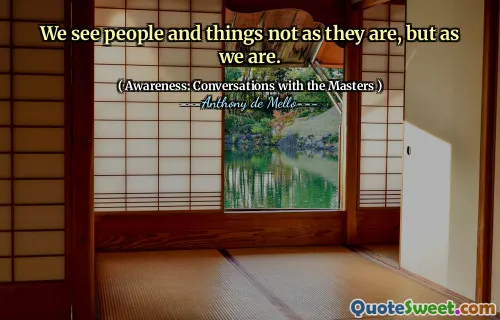
We see people and things not as they are, but as we are.
This quote emphasizes the subjective nature of perception and how our internal states influence our view of the world around us. It suggests that our perceptions are often filtered through our beliefs, experiences, biases, and emotions, which means we interpret people and events based on who we are rather than how they truly are. This concept resonates deeply with the idea that understanding others requires self-awareness; without knowing ourselves, we risk projecting our inner narratives onto external reality. For instance, a person with trust issues might view others as untrustworthy, while someone more open and confident might see similar behavior as harmless or genuine. Such differences highlight that our subjective lens shapes our perception, leading to misunderstandings or biases. Recognizing this tendency is the first step toward cultivating empathy and openness. When we acknowledge that our perspective is limited and colored by our internal state, we're more inclined to listen, understand, and see the truth beyond our immediate filters. This awareness can be transformative, fostering personal growth and improved relationships. The quote also points to the importance of self-reflection: examining our beliefs and assumptions can lead to a clearer, more compassionate view of others. By changing ourselves internally, our perception of the external world shifts. As such, self-awareness becomes a vital tool for perceiving reality more accurately and developing genuine connections. Overall, this insight challenges us to look inward and question the lenses through which we see the world, emphasizing that change begins within.

